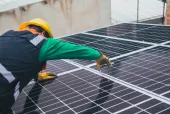Thailand’s renewable energy adder rates
By Christopher Osborne Thailand underpinned its credentials as a leader in the Asian power sector for renewable energy by introducing a comprehensive package of adder rates for renewable energy technologies in 2007, and currently offers incentives for biomass/biogas, solar (thermal and photovoltaic), wind and mini/micro hydropower projects.
Adder rates are available for VSPPs (Very Small Power Producers, producing up to 10 mW) and all adder rates except for hydropower are available for SPPs (Small Power Producers, producing from 10mW up to 90 mW). The adder rates are payable in addition to the normal price of electricity paid to VSPPs and SPPs.
Adder rates for solar and wind projects apply for ten years and adder rates for other renewable energy projects apply for seven years.
Renewable technology Adder rate (Baht/kW hour)*
Biomass/biogas (>1 MW / up to1 MW) 0.30 / 0.50
Hydro (50-200kW/<50kW) 0.80 / 1.50
Waste (landfill, digestion/thermal) 2.50 / 3.50
Wind (> 50kW /up to 50 kW) 3.50 / 4.50
Solar (Thermal and photovoltaic) 6.50
* 1 USD = 31.6 Baht, July 2012
Additional adders are also available for projects located in Thailand’s three southernmost provinces of Yala, Pattani and Narathiwat (where civil unrest has received consistent media coverage for several years) and for projects which replace electricity produced by diesel generators.
Additional adder rates (Baht/kW hour):
- Southern provinces: 1.50 for solar and wind, 1.00 for other renewables
- Diesel replacement: 1.50 for solar and wind, 1.00 for other renewables
Watch out for the solar bottleneck
The solar adder rates need to be viewed in the context of projects for which approvals have already been sought or granted. Solar adder rates were introduced in 2007 at a rate of 8 Baht per kW hour and while some projects are now established and operational at this rate, the solar adder rate was decreased to 6.5 Baht per kW hour in 2010.
The interest in solar projects has been so high that applications exceeded Thailand’s solar energy targets several times over in terms of capacity. In 2010, EGAT (the Electricity Generating Authority of Thailand, which deals with SPPs), PEA (the Provincial Electricity Authority which deals with VSPPs outside Bangkok) and MEA (the Metropolitan Electricity Authority, which deals with VSPPs in the Bangkok metropolitan area) issued announcements that they would no longer accept applications for power purchase agreements for solar projects if adder rates are involved.
It is understood that the suspension is temporary, to enable EGAT, PEA and MEA to identify projects for which applications have been lodged, but which are unlikely to proceed, before reopening the application process, and it is generally expected that the adder rate could be reduced when applications resume.
As the 8.0 Baht and 6.5 Baht adder rates are presently only available to solar projects for which applications have already been made, new entrants to the Thai solar market who require adder rates and do not wish to wait for applications to resume will need to acquire an interest in an existing solar project.














 Advertise
Advertise











